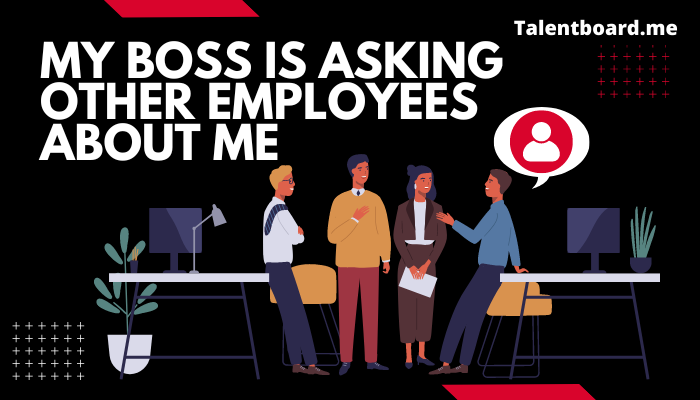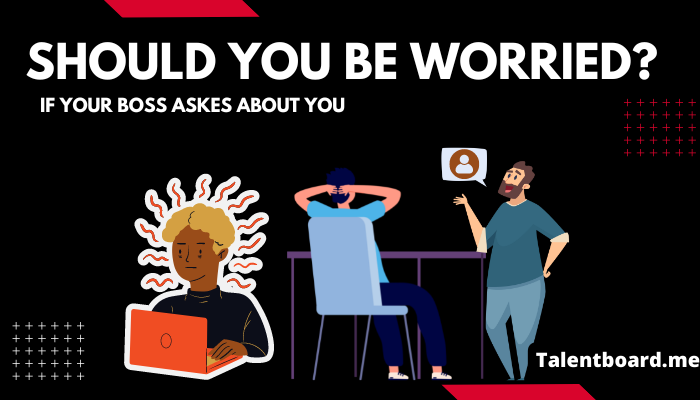My boss asks other workers about me in the company. How many nights have you stayed up thinking about how to solve this problem? Since it’s your boss and not a coworker, you need to be careful.
Relax! He might simply desire to be aware of you. Or he may be so impressed with your skills that he wishes to share them with others. Let’s start to figure out why he might be talking to other employees about you.
Employees are a company’s most precious assets. There are specific standards that employers continue to hold their employees to, although technological advances have caused significant shifts in the workplace.
In addition to the employee’s demonstrated ability to do their job duties effectively, an employer will look for intangible traits that will contribute to the continued growth and prosperity of the business.
My boss is asking other employees about me?

Every boss wants to be aware of their workers’ work routines, performance, schedules, preferences regarding communication and feedback, and, to some extent, information regarding employees’ personal goals in relation to their professional development goals.
The fact that your employer is inquiring with other people is not unusual and should not be taken seriously. They sometimes keep a close eye on their staff and check in with them frequently.
They want to be the ones who provide constant coaching and feedback across a wide range of skills, and they have good intentions to do so.
It’s also feasible that your boss cares not only about the outcomes you create but also about how well you are growing in your profession and improving the knowledge you already have.
A reasonable probability exists that they do not anticipate you being in your current role forever, and there is also a high potential that they are your ticket to a promotion. Both of these possibilities are wonderful news for you.
Suppose you are given more leeway than the other workers, more flexibility to take risks, work your hours, and make your own decisions.
In that case, this is a fantastic indicator that your manager thinks highly of you and wants to keep you on as an employee.
To the degree practicable, companies should also preserve strict confidentiality regarding employee status, salary, performance, and medical information.
Employers should not engage in talks or disclose information about other employees with their coworkers, with rare exceptions.
Read Also: My boss has changed towards me [10 Signs]
Should you be worried?
Don’t be concerned if your boss is checking in with you to see how things are doing with you. According to Tulgan, bosses will go out of their way to check on employees so that they have a positive relationship.
They will inquire about your level of contentment, whether or not you have plans to quit, and how the business may continue to benefit from your presence.
Your boss is not conducting an interrogation of you; rather, they are proactively determining what actions they will need to do in order to keep you on staff. There aren’t usually clear indicators that your boss has a favorable opinion of you right away.

How Do You Put Online Certifications on Your Resume
If your boss is always asking you to train new employees at the workplace or to walk your coworkers through the operation of certain processes, it may appear as though they are trying to shift additional responsibilities onto your shoulders. And there are situations in which it could very well be the case.
In general, you shouldn’t be too concerned about this. Your colleagues will let you know if they think your performance is satisfactory.
The ability to communicate clearly and effectively is essential
If your performance has been poor, then this will bring to light even more of the issues. In either case, the goal is to acquire a clearer picture of the situation. But also recognize that you are engaged in a Conflict with a Bully
Many individuals are under the impression that bullies are just those with whom you had to contend when you were younger. The unfortunate reality is that this is not the case.
You have to come to terms with the fact that they are a bully regardless of whether or not you have confronted your boss about the talk. As a result of this, you should be prepared to communicate with them.
On the other hand, it’s possible that your boss will be so impressed with your abilities that they will want to share them with others.
Instead of viewing these requests as additional busy work to be completed, consider them opportunities to enhance your leadership qualities and exhibit your knowledge within the company.
Can an employer talk bad about you to other employees?
There are certain things that an employer is not allowed to say about an employee, regardless of whether that employee is still working there or has left the company.
Suppose you discover that an employer is knowingly slandering you by stating things designed to damage your character or bring your good name into disrepute.
In that case, you have the authority to take action against the employer. One principle applicable across the board is referred to as “qualified privilege,” and each state has its own set of regulations intended to protect both employees and employers.
Even if you were a poor worker, most companies would not provide detailed information about how you conducted yourself while on the job. They are not allowed to fabricate falsehoods to tarnish your reputation and make it more difficult for you to get work elsewhere.
Nevertheless, employers should, to the greatest degree practicable, maintain strict confidentiality concerning employee status, salary, performance, and medical-related information.
Employers should, with very few exceptions, avoid having conversations or making disclosures with their coworkers about other employees or disclosing information about employees.
- Dangers of Gossip
However, if the gossiper has a large amount of control over the recipient of the gossip, the situation might become quite dangerous.
- Company Policies
The employee handbooks of many companies contain formal regulations that prohibit employees from engaging in gossip.
Suppose you conclude that your employer is spreading false and defamatory claims about you verbally or in writing. In that case, you have the right and the ability to initiate a case for slander or defamation of character.